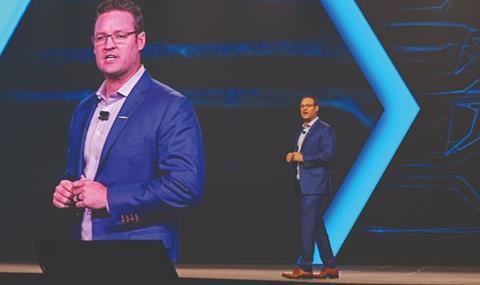
Trevor Milton (pictured), CEO of Nikola Motor Company, has accused OEM truck giants of putting the brakes on the switch to zero emissions but warned them that the days of diesel are “dying pretty quick”.
Speaking to motortransport.co.uk following the release of new data by the European Automobile Manufacturers’ Association (ACEA) showing that 98.3% of all heavy and medium trucks on Europe’s roads still run on diesel, he admitted he had become infuriated by the “arrogance” of the OEMs he had tried to partner with.
“All they did was talk about how good they are, how big they are, how they are number one or number two or whatever,” he said. “It made me cringe. I hate everything about it.”
Milton went on to claim that manufacturers like Volvo and Daimler remained reluctant to consider alternative fuels.
“They literally said ‘it is not possible to meet these emissions standards’ – and that is total bullshit. They just wanted to sit there and reap billions of dollars of rewards off their diesel programmes, and I’m tired of it. It’s over.”
A pioneer in the development of heavy-duty electric vehicles, Nikola has recently signed a deal with IVECO, which Milton revealed was the only OEM prepared to admit it was “struggling” with emissions targets.
While agreeing that diesel trucks had “quite some time” left, he warned OEMs that it will “become so cost prohibitive to own them based upon emissions regulations”.
“Nobody is putting R&D into diesel anymore,” he explained. “It is completely done. One of the suppliers just announced that it is getting out of diesel injectors. That’s a massive problem. There is no investment into diesel. It is all going into zero emission.
“So, it’s just a matter of time until all the orders coming in are for zero emission. The problem is none of the OEMs can build enough to satisfy the market, so for the next 10 years they [diesel trucks] will still exist, but their values will plunge and their costs will go up. They’re dying pretty quick.”
Read more
- Self-driving trucks are a reality today but the electric vehicle recharging network is still in the future
- Diesel will be the high-risk gamble’ suggests battery electric truck start-up
- DPD ramps up electric vehicle plans and calls for faster industry adoption
Milton’s views have been backed up by the new ACEA research which advocates “the rapid roll-out of dedicated charging and refuelling infrastructure for trucks – which is completely absent today – and putting in place meaningful incentives to make these vehicles a commercially-viable and competitive choice for transport operators”.
On 6 December in Brussels for an ACEA board meeting, industry chiefs stressed that the transition to zero emissions cannot happen without radical policy changes by the EU and the governments of all member states.
“When we look at the total fleet of transport operators today, it is clear that the market will need to be completely turned around in an extremely short time frame,” stressed Gerrit Marx, chairman of ACEA’s commercial vehicle board and president of CNH Industrial Commercial Vehicles and Speciality.
“If we are to transform this startling picture and convince hauliers to make the switch to low- and zero-emission vehicles on a large-scale, Europe urgently needs to introduce a strong package of consistent and predictable policy measures,” Marx urged EU policy and decision-makers.
“Creating real market demand for low- and zero-emission vehicles should now be the priority. Binding sales quotas for manufacturers, on the other hand, would not do anything to encourage transport companies to purchase alternatively-powered trucks.”
Meanwhile, Milton went on to claim many OEMS have always had the technology to switch and said they wouldn’t be prepared to let companies like Nikola and Tesla “sit back and kick them”.
“They will react, they’ll move fast,” he said, “but the best news is that Nikola will always be known as the company that changed the world of trucking. Nobody else will ever get that title.”
Milton also confirmed that Nikola Tre – “the only zero-emission artic that can drive for more than 200 miles” – would be in production by 2021.













